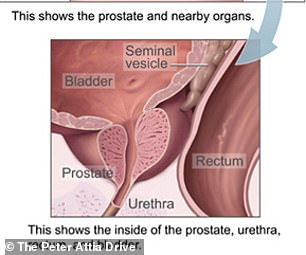I’m a urologist – here’s how to stop waking up in the middle of the night to pee
A leading urologist has revealed how men can avoid waking up in the middle of the night to go to the toilet.
More than 60 million men aged 50 and older have their sleep disturbed at least once a night to go to the toilet. They suffer from a condition doctors call nocturia.
Dr. Edward (Ted) Schaeffer, of Northwestern University in Chicago, Illinois, said this nighttime disturbance was caused by the normal enlargement of the prostate, which puts pressure on the bladder.
To break the habit and get an uninterrupted night’s sleep, he suggested three tips to reduce middle-of-the-night urination.
On the Peter Attia Drive Podcast, he said: ‘You can go from peeing twice a night to once at night just by changing what you drink and wearing tight stockings.
‘It may not apply to everyone, but it certainly encourages people to do simple things without doing the polypharmacy.’
The hacks include not drinking water before bed as it can quickly filter from the blood and fill the bladder, forcing a person to use the toilet
Don’t drink water before going to bed
Dr. Schaeffer urged men not to drink a glass of water before going to bed at night.
He said: ‘A lot of people come in with nocturnal urinary frequency and a lot of that can simply be adjusted with education.
‘So by saying; “Hey, don’t drink a glass of water right before you go to bed.”

Dr. Edward Schaeffer revealed tips to avoid nighttime urination
‘And, “If you get up in the middle of the night because you have to pee, don’t drink another glass of water as soon as you get up to pee” – (that can help).’
Drinking water just before bedtime increases the amount of fluid in the bloodstream, which is then quickly filtered out by the kidneys.
This causes fluid to accumulate in the bladder, causing a man to have to go to the toilet within a few hours.
Young men can avoid this because they have higher levels of an anti-urine production hormone called ADH in their bloodstream when they go to bed and have a more elastic bladder, reducing the risk of having to urinate during the night.
But older men, especially those over 50, have much lower levels of this hormone at night and a less elastic bladder.
Wear knee-high stockings
Dr. Schaeffer also recommended that men with signs of fluid retention in their legs wear knee-length socks to bed.
Fluid retention is more common in obese or overweight people, who are at greater risk of edema, when the feet are swollen or there is a ‘ringing’ sound across the socks due to excess fluid in the body.
Dr. Schaeffer said, “One of the behavioral changes is knee socks for people who, if I see them at 8, 9, 10 o’clock and they have edema… I certainly strongly encourage them to do that.
“I tell people that if you get up twice a night and you have a little bit of edema, we’ll make some behavioral changes and we can reduce the nighttime urinary frequency.”
Edema indicates that fluid is retained in the space between cells in the body.
When a person goes to bed, doctors say this fluid can then flow back into the bloodstream and be filtered by the kidneys into the bladder, causing them to urinate.
To prevent this, doctors say knee-high stockings reduce fluid retention in the feet, reducing the risk of nighttime urination.
Avoid beer before bedtime
It may sound obvious, but Dr. Schaeffer also said people should avoid drinking alcohol before bed, including beer.
Dr. Schaeffer warned that the drink’s high moisture content causes the bladder to fill quickly, while the alcohol it contains suppresses the anti-urinary production hormone.
Dr. Peter Attia said: ‘Alcohol inhibits this hormone by the way and that’s why drinking alcohol before bed is a great recipe for having to get up and pee.
“You get the liquid in the drink and then you get a molecule that inhibits the release of the antidiuretic hormone.”
Doctors also discourage people from drinking alcohol before going to bed, saying it can disrupt their sleep.
Why do older men have bladder problems?
Nearly all men will experience urinary problems at some point in their lives or know someone who does, Dr. Schaeffer said.
This is related to the architecture of the male body behind urination and to changes in the body that occur as men age.

The diagram above shows how the urethra passes through the prostate
The urethra – or tube that carries urine and semen out of the body – runs directly through the center of the prostate.
But the prostate — which is responsible for making some of the sperm — gradually enlarges in men as they age.
Doctors aren’t sure why this is the case, but say it may be related to fluctuations in hormone levels.
The larger prostate then puts pressure on the urethra, causing the bladder to work harder to push urine out of the body.
This in turn reduces the ability to retain urine and increases the risk of needing to urinate more often, including at night.
Over time, older men also have lower peaks in the hormone ADH before bed, which causes their bodies to produce more urine at night and increases their urinary frequency.
